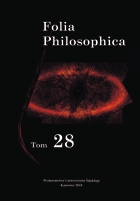Argumentacja Alana Hájka dowodząca wadliwości zakładu Pascala
Alan Hájek’s argument for fallaciousness of Pascal’s Wager
Author(s): Marek WójtowiczSubject(s): Philosophy
Published by: Wydawnictwo Uniwersytetu Śląskiego
Keywords: Pascal’s Wager; Hájek; Alan; God; probability
Summary/Abstract: Pascal’s Wager is still one of the most original arguments concerning the fundamental issues of philosophy of religion. What is especially interesting here is its multi-faceted character, as philosophical and theological analysis is combined with elements of probability calculus and game theory. The aim of the paper is to present its critique by Alan Hájek, contemporary Australian philosopher. Hájek argues that Pascal’s idea of “profitability” of the faith in God is based on a fallacious argument. On the ground of contemporary knowledge in probability Hájek declines all three Pascal’s key premises: 1. It is rational to ascribe positive value to the probability of God’s existence. 2. Man has to choose to believe or not to believe and it is possible to predict the consequences of this choice depending on whether God exists or not. 3. Rationality demands to choose the act which leads to the biggest expected value.
Journal: Folia Philosophica
- Issue Year: 2010
- Issue No: 28
- Page Range: 193-209
- Page Count: 17
- Language: Polish

